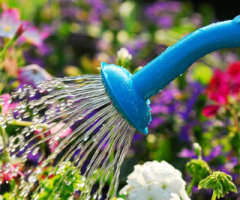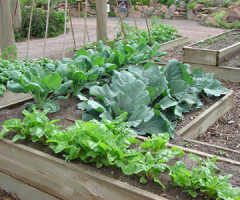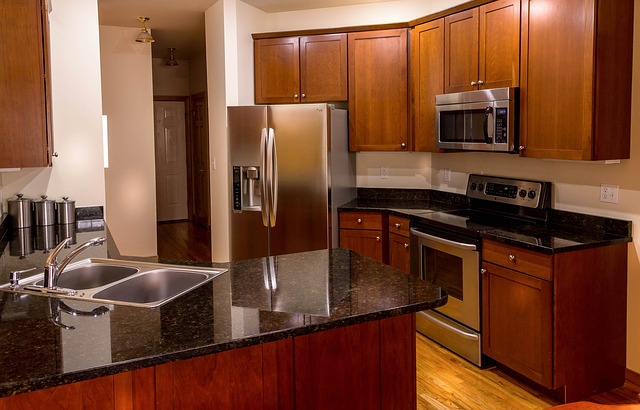
Many homeowners would love to have their own garden space; be it small or be it to a large scale, flowers or crop farming. From kitchen gardens, basic flower gardening to larger scale farming read on for simple everyday tips on maintenance of your greenery.
Basic tips to follow
Watering your plants
 Watering is paramount; plants lose water and you have to ensure that you must replenish the water supply. Do it often especially in warmer weather as when it is hot, water is lost from the soil through evaporation.
Watering is paramount; plants lose water and you have to ensure that you must replenish the water supply. Do it often especially in warmer weather as when it is hot, water is lost from the soil through evaporation.
Follow these simple tips when watering your plants.
-The three step rule
- Look: if the plants are droopy or wilting they need immediate attention.
- Listen: tap your clay pot with a broom to ascertain the amount of compost.
- Touch: if your compost is moist but not soggy it is good to go, if it feels dry though you should add water at once.
-If your plants are in pots, pick up the pot and if it feels light it needs watering. Sometimes you should stand your plants in a bucket so they can soak the water right up into the compost; this is a better method than using a watering can as the water will run straight through and around the dry compost where it has shrunk away from the side of the pot.
-When you water your plants make sure it gets right down to the roots then to reduce evaporation further, cover the soil with mulch. Ensure also that you do not overwater the plants
Feed your plants
-To keep your plants growing healthily, plants absorb through their roots about 30 different nutrients and minerals dissolved in water. The most important are nitrogen (N), phosphorous (P) and potassium (K) but there are numerous minerals that help the plant develop healthily. Ensure that you do not deplete the nutrients in the soil; do not over clip, weed to often or mow too much as this will remove the nutrients the soil reserves for the plant.
Fertilizer
-Fertilizers are categorized into organic and inorganic; organic are derived from natural sources such as plants or animals while inorganic are mainly man made or chemical. Plants require fertilizer, regardless of which you opt for, organic fertilizers are encouraged however as they encourage soil bacteria and this keeps the soil healthy. You could opt for general fertilizer too or If you look out for the fertilizer details, note the NPK ratio, nitrogen helps encourage leafy growth, phosphorous encourages root development and potassium encourages fruit and flower production.
Light
-Light is the most basic need of any plant; plants process their food through photosynthesis which requires sunlight to occur. You should however note that different plants have different light needs; it could require Direct sunlight where the sunlight hits the plant directly, without any barrier, Indirect sunlight where light shines in a room but not directly on a plant or Diffused light where the light is filtered through a screen or sheer curtain before reaching the plant.
Specifics: The vegetable garden
 -The first would be to plan the garden space; depending on the requirements of each vegetable choose a suitable layout that will ensure they grow and produce healthy crops. Look at which plants need lots of sunlight, less sunshine, water availability and such when planning the space.
-The first would be to plan the garden space; depending on the requirements of each vegetable choose a suitable layout that will ensure they grow and produce healthy crops. Look at which plants need lots of sunlight, less sunshine, water availability and such when planning the space.
-Group plants with similar requirements together, just to make your life and maintenance a bit easier.
-Experiment with your garden and grow a variety of crops; with time you will be able to learn what grows best where, in which season and how to maintain it as this is important to the success of the crops growth. In line with experimenting you should also grow what you like and an amount suitable for the purpose intended; if for household meals you can have a small kitchen garden but if you wish to make sales then you may have to expand.
-Rotate the crops; this prevents pests from familiarizing with the plants and causing too much damage.
-Take care of your plants; provide manure and compost, also use fertilizer as required and water them regularly.
-Inspect your plants; even before you buy seedlings from a nursery take a good look at it before bringing it home. Even after it has been planted keep a good look on the plants to ensure they grow well and nip any problems in the bud.
-Support climbing plants
-Tend to the garden; control the weeds and pests. Since the food will be consumed you have to take it easy on the chemicals. Most plants can resist pests and diseases if cared for appropriately; basic watering, fertilizing, pruning.
-When it is time harvest your food, this will not only make the plants produce longer but will give you a sense of satisfaction and accomplishment.







